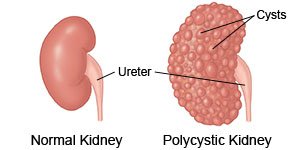Autosomal Dominant Polycystic Kidney Disease
Medically reviewed by Drugs.com. Last updated on Apr 6, 2025.
Autosomal dominant polycystic kidney disease (ADPKD) is a condition that causes many cysts to grow in your kidneys. ADPKD is most often caused by damaged genes, which are inherited from a parent. The cysts may become large and damage your kidneys. When damage occurs, your kidneys may not work properly, or may stop working completely.
 |
DISCHARGE INSTRUCTIONS:
Medicines:
- You may need medicines to keep your blood pressure normal or to lower the amount of cholesterol in your blood. You may need antibiotics to treat an infection caused by bacteria if you have a UTI. You may also need over-the-counter or prescription pain medicine. Ask your provider which pain medicine is best for you. Some pain medicines may be harmful to your kidneys.
- Take your medicine as directed. Contact your healthcare provider if you think your medicine is not helping or if you have side effects. Tell your provider if you are allergic to any medicine. Keep a list of the medicines, vitamins, and herbs you take. Include the amounts, and when and why you take them. Bring the list or the pill bottles to follow-up visits. Carry your medicine list with you in case of an emergency.
Follow up with your healthcare provider as directed:
You may be referred to other specialists. Write down your questions so you remember to ask them during your visits.
Nutrition:
Your provider may be recommend a special diet to help slow the progress of your disease. You may need to limit protein and sodium (salt). Ask your provider about these and any other diet changes you need to make.
Treatment options
The following list of medications are related to or used in the treatment of this condition.
Genetic counseling:
During genetic counseling, you and your family will learn about genetic diseases. This information may help you make important decisions, such as planning a family.
Contact your healthcare provider if:
- You are female and know or think you are pregnant.
- You have a bitter taste in your mouth.
- You feel full after eating only a small amount of food, or you have a decreased appetite.
- You have a fever.
- You have pain in your back and sides.
- You have pain when you urinate.
- You have questions or concerns about your condition or care.
Seek care immediately or call 911 if:
- You have any of the following signs of a stroke:
- Numbness or drooping on one side of your face
- Weakness in an arm or leg
- Confusion or difficulty speaking
- Dizziness, a severe headache, or vision loss
- You have chest pain or shortness of breath.
- You have a very bad headache, or you have frequent headaches.
- You have swelling in any part of your body.
- You have pain in your abdomen.
- You have yellowing of your eyes or skin.
- You see blood in your urine.
© Copyright Merative 2025 Information is for End User's use only and may not be sold, redistributed or otherwise used for commercial purposes.
The above information is an educational aid only. It is not intended as medical advice for individual conditions or treatments. Talk to your doctor, nurse or pharmacist before following any medical regimen to see if it is safe and effective for you.
Learn more about Autosomal Dominant Polycystic Kidney Disease
Treatment options
Care guides
Symptoms and treatments
Further information
Always consult your healthcare provider to ensure the information displayed on this page applies to your personal circumstances.
